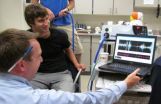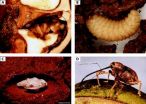(Press-News.org) LEXINGTON, Ky. -- A study recently published by the University of Kentucky's Scott Livingston shows that physiological problems stemming from a concussion may continue to present in the patient even after standard symptoms subside.
Currently, concussions are diagnosed and monitored through a patient's self-reported symptoms (including headache, confusion or disorientation, poor concentration, and memory loss) and through computerized neuropsychological testing programs, which measure cognitive abilities including attention and concentration, cognitive processing, learning and memory, and verbal fluency. Post-concussion abnormalities in either of these markers typically return to a normal level within five to 10 days following the injury.
Conducted while he was a graduate student at the University of Virginia, Livingston's study was just published in the February 2012 issue of the Journal of Clinical Neurophysiology. The study used motor-evoked potentials (MEPs) — an electrophysiological measurement that can provide hard evidence for changes in brain function — to determine if any physiological abnormalities followed a similar recovery pattern to self-reported symptoms and neuropsychological testing.
During an MEP test, subjects have electrodes placed on a limb – such as the hand or foot. A magnetic stimulating device is placed over the head, and they receive a brief pulse of magnetic stimulation to the brain. The "reaction time" — the amount of time it takes for the subject's limb to receive the response from the brain after the stimulation — is recorded.
Livingston's study enrolled 18 collegiate athletes — nine who had been concussed within the previous 24 hours, and nine who had not experienced a concussion. Each concussed subject was matched with a non-concussed subject using age, gender, sport, position played, prior concussion history, and history of learning disability or attention deficit-hyperactivity disorder as inclusion criteria.
Subjects were evaluated for evidence of concussion based on self-reported symptoms, computerized neurocognitive test performance, and MEPs for a period of 10 days. Post-concussion symptoms were more frequent and greater in severity in the immediate timeframe after the injury (24-72 hours) and decreased in the following days. Some subjects reported no symptoms by day 10, though others did not have complete symptoms resolution by that time. Neurocognitive deficits followed a similar pattern, proving greater just after the injury and returning to normal (or closer to normal) by day 10.
VIDEO:
The University of Kentucky's Scott Livingston discusses preseason baseline testing for concussions in athletes.
A recently published study performed by Livingston while he was at the University of Virginia used motor-evoked...
Click here for more information.
MEPs, however, showed delays in response time and smaller MEP size which continued up to day 10, with these physiological changes actually increasing as the concussed athletes' symptoms decreased and cognitive functioning improved.
Livingston, director of the UK Concussion Assessment Research Lab and assistant professor in the Department of Rehabilitation Sciences, says these findings are significant for both athletes and sports medicine clinicians.
"Further investigation of MEPs in concussed athletes is needed, especially to assess how long the disturbances in physiological functioning continue after those initial ten days post-injury," Livingston said. "But in the meantime, sports medicine personnel caring for concussed athletes should be cautious about relying solely on self-reported symptoms and neurocognitive test performances when making return-to-play decisions."
Livingston's research lab recently began a new program to further study MEPs in athletes pre- and post-concussion. At UK, all athletes who participate in a contact sport — including football, soccer, volleyball, diving, gymnastics, and basketball — are assessed preseason using MEP and neurocognitive testing to establish a baseline measure for each athlete.
If an athlete receives a concussion, he or she will come back to the lab as soon as possible after the injury for follow-up testing. This approach allows researchers to get a clearer idea of the extent of an athlete's injury, Livingston says.
Neurocognitive tests, such as the Immediate Post-Concussion Assessment and Testing (ImPACT)™, are a valuable component of concussion management. While major professional sports organizations like the NFL and NHL, as well as hundreds of colleges, universities, and high schools across the United States follow this standard, UK Athletics did not have a formal, standardized neurocognitive testing protocol in place until last year. The addition of the MEP assessment in the preseason testing and post-concussion management are unique — UK is the first and only collegiate athletics program to implement a baseline physiologic measure of brain function.
"No other college of university in the country is currently assessing physiologic brain responses and using this information to determine the extent of the functional brain injury," Livingston said. "This type of information enables us to closely track recovery, which may not correspond to the decrease in concussion symptoms or recovery of memory and other cognitive functions."
INFORMATION:
Effects of a concussion may last longer than symptoms, study shows
2012-03-01
ELSE PRESS RELEASES FROM THIS DATE:
Foresters UK Sponsors Wallace and Gromit 'Big Breakfast'
2012-03-01
Foresters are pleased to announce that they will be sponsoring Wallace and Gromits 'Big Breakfast' fundraising event from 20th - 27th April.
Wallace & Gromit are calling on people across the UK to join The BIG Breakfast to raise thousands of pounds for sick children in hospitals and hospices by enjoying their BIG Breakfast. People from all walks of life are being invited to take part and host a 'Wallace & Gromit BIG Breakfast', from the 20th - 27th April. The fundraising event hopes to raise over GBP60,000.
'Wallace & Gromit's Children's Foundation is ...
Green schools and students' science scores are related
2012-03-01
A nationwide survey shows a positive correlation between Green School practices and student achievement in science. The study was conducted by the University of Colorado Denver's Department of Geography and Environmental Sciences. And presented Wednesday at the Green Schools National Network conference in Denver.
Schools that took part in the survey observe GreenPrint core practices as defined by the Green Schools National Network (GSNN). The core practices are:
Curriculum that advances environmental literacy and sustainability
Stewardship and service learning
Sustainable ...
Queen's professor urges health research to focus on the positive
2012-03-01
Political Studies professor Colin Farrelly wants to see more research into remarkable examples of health – such as why some people live 100 years disease-free.
He describes the current pathology-based approach that emphasizes what causes specific diseases as "negative biology" and suggest more resources should be focused on "positive biology."
"Currently the medical sciences presume that answering the question 'what causes disease?' is the most significant question to ask and answer," says Professor Farrelly. "Positive biology encourages us to invest just as much time, ...
Reversing Alzheimer's gene 'blockade' can restore memory, other cognitive functions
2012-03-01
CAMBRIDGE, Mass. -- MIT neuroscientists have shown that an enzyme overproduced in the brains of Alzheimer's patients creates a blockade that shuts off genes necessary to form new memories. Furthermore, by inhibiting that enzyme in mice, the researchers were able to reverse Alzheimer's symptoms.
The finding suggests that drugs targeting the enzyme, known as HDAC2, could be a promising new approach to treating the disease, which affects 5.4 million Americans. The number of Alzheimer's victims worldwide is expected to double every 20 years, and President Barack Obama recently ...
Why birds of a feather lek together
2012-03-01
VIDEO:
Certain kinds of male birds gather into small clusters of land called leks to perform their courtship dances, and according to science, who they choose to associate with matters....
Click here for more information.
CORAL GABLES, FL -- Certain kinds of male birds gather into small clusters of land called leks to perform their courtship dances, and according to science, who they choose to associate with matters. A new study by University of Miami Evolutionary Biologist ...
International Bestselling Author Neil Strauss Releases New Party Game with Hasbro Game Inventor Thanks to Facebook - "Who's Got Game?" is the Ultimate Party Game with 'Game!'
2012-03-01
As a journalist for Rolling Stone and The New York Times, Strauss has interviewed celebrities from Lady Gaga to Tom Cruise to Howard Stern and hundreds more. He's picked up Brittany Spears and wooed Jessica Alba on Jimmy Kimmel Live. Now he's taken all that knowledge and experience about social dynamics and packed it into the ultimate party game called "Who's Got Game?"
The Backstory: How Facebook Paved the Way for Turning the Game from a Dream into a Reality:
How did "Who's Got Game?" come to be? Through social networking, a young entrepreneur ...
Who's in the know? To a preschooler, the person doing the pointing
2012-03-01
If you want a preschooler to get the point, point. That's a lesson that can be drawn from a new study in Psychological Science, a journal published by the Association for Psychological Science. As part of their investigation of how small children know what other people know, the authors, Carolyn Palmquist and Vikram K. Jaswal of the University of Virginia, found they were able to mislead preschoolers with the simple introduction of a pointing gesture. "Children were willing to attribute knowledge to a person solely based on the gesture they used to convey the information," ...
New infant formula ingredients boost babies' immunity by feeding their gut bacteria
2012-03-01
URBANA – Adding prebiotic ingredients to infant formula helps colonize the newborn's gut with a stable population of beneficial bacteria, and probiotics enhance immunity in formula-fed infants, two University of Illinois studies report.
"The beneficial bacteria that live in a baby's intestine are all-important to an infant's health, growth, and ability to fight off infections," said Kelly Tappenden, a U of I professor of nutrition and gastrointestinal physiology. "Breast-fed babies acquire this protection naturally. Formula-fed infants get sick more easily because the ...
University of Tennessee researchers invent device to rapidly detect infectious disease
2012-03-01
Infectious diseases can spread very rapidly, so quickly identifying them can be crucial to stopping an epidemic. However, current testing for such diseases can take hours and days. But not for much longer.
Jayne Wu, associate professor of computer science and electrical engineering at the University of Tennessee, Knoxville, and Shigetoshi Eda, associate professor of Forestry, Wildlife and Fisheries at the UT Institute of Agriculture Center for Wildlife Health, have developed a portable device that can be used onsite to detect infectious diseases, pathogens as well as ...
Pecan weevil biology, management and control strategies
2012-03-01
The pecan weevil, Curculio caryae (Horn), is a major pest of pecans throughout the southeastern United States, as well as portions of Texas and Oklahoma.
In "Biology and Management of the Pecan Weevil (Coleoptera: Curculionidae)," (http://bit.ly/xrqS3d) a new article appearing in the Journal of Integrated Pest Management, scientists from Oklahoma State University and Texas A&M University describe the biology, life stages, crop injury, monitoring approaches, and primary control strategies currently used for pecan weevil in pecan.
Aimed at pecan growers extension personnel ...



